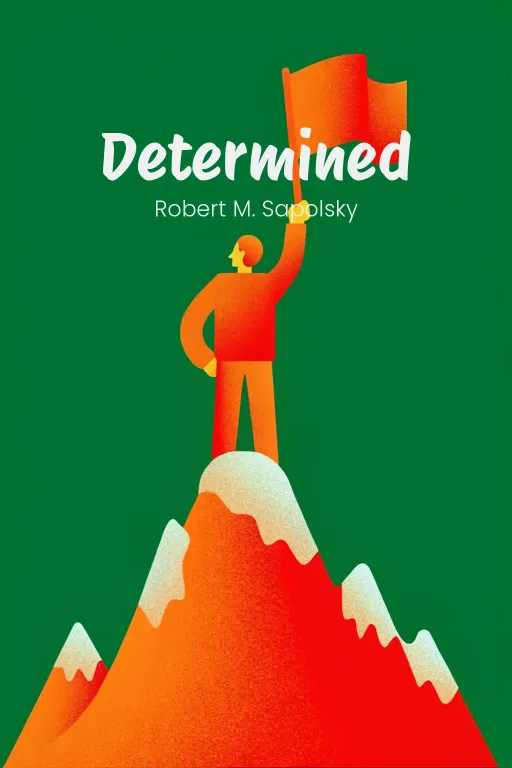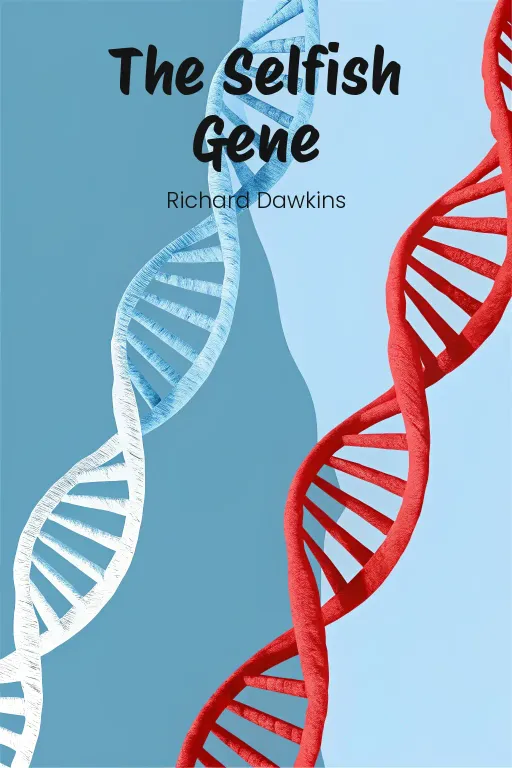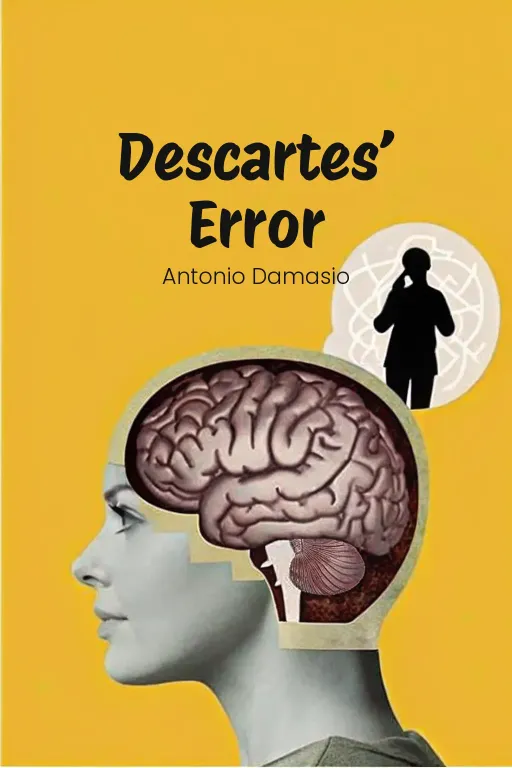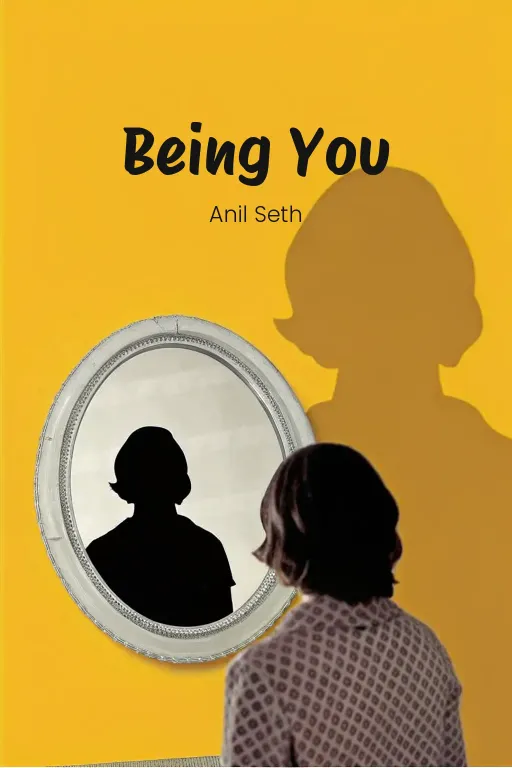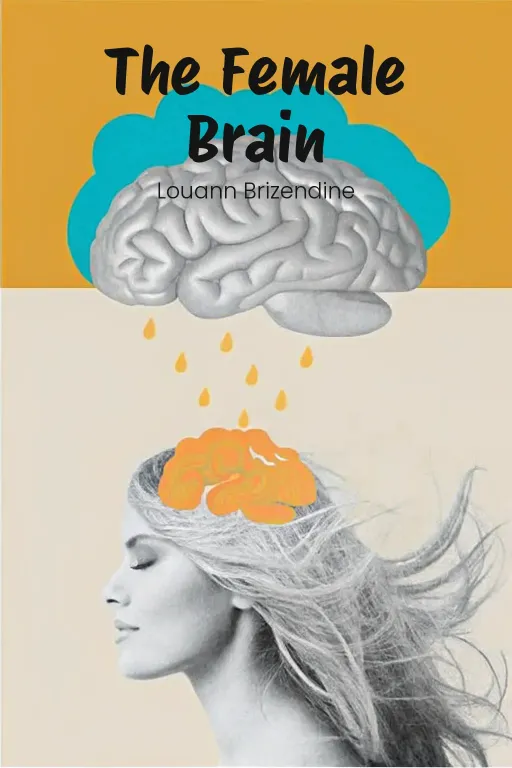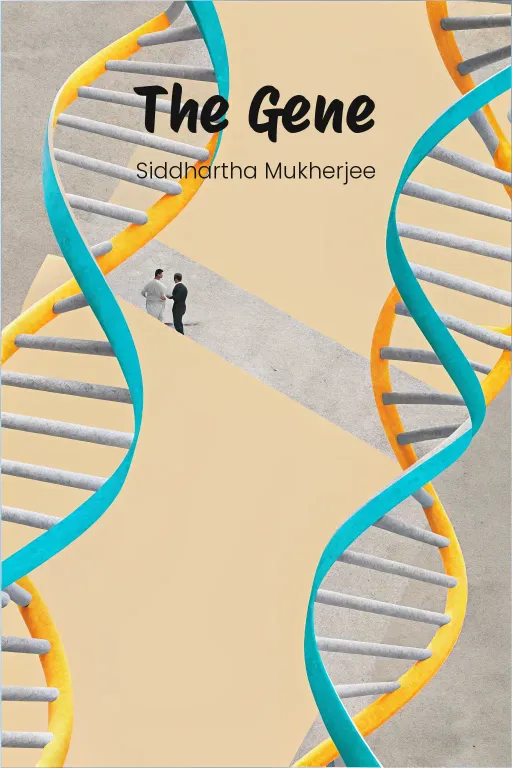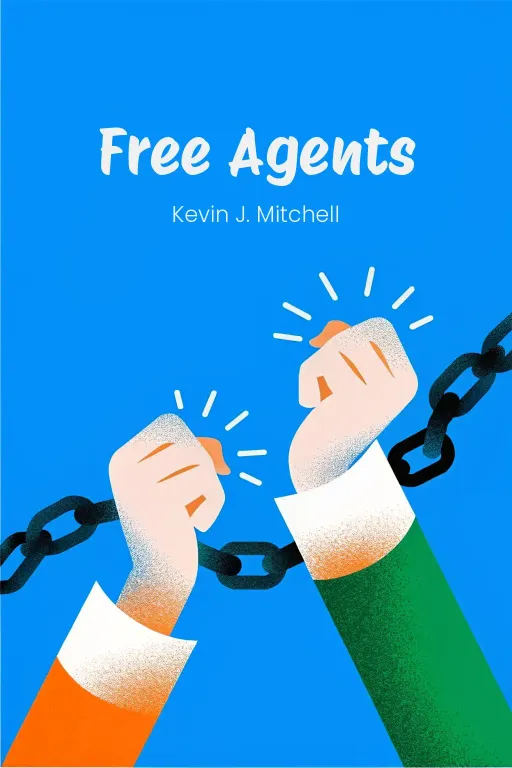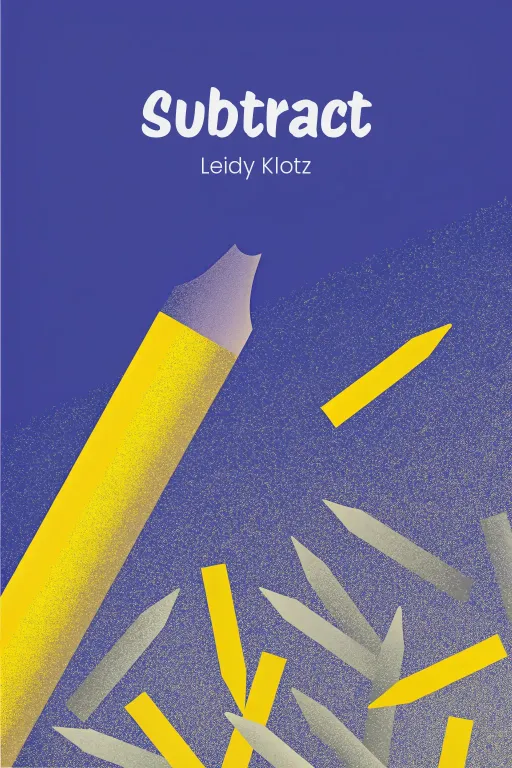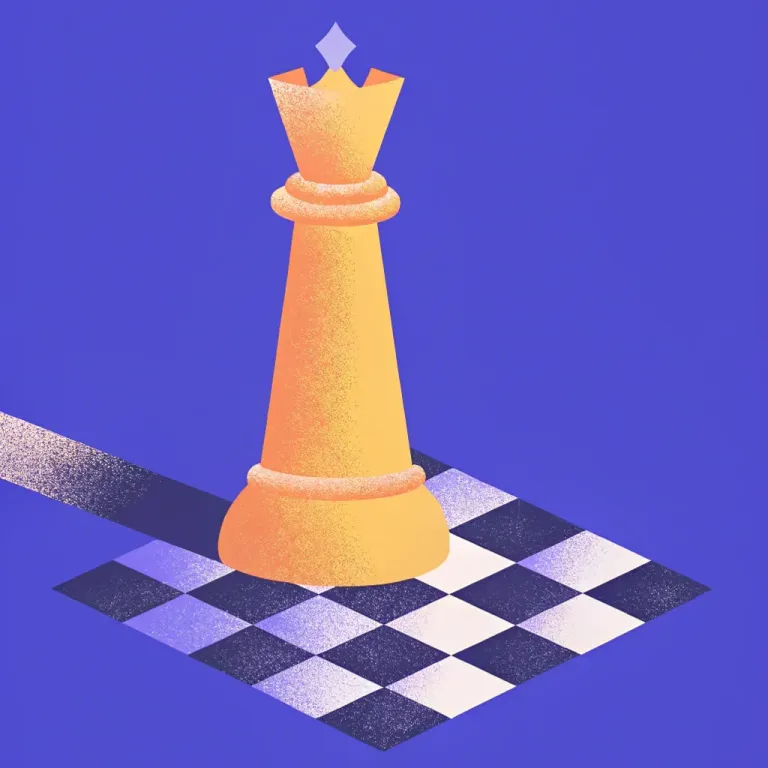
Control Is A Lie: The Brain's Secret Script
Podcast by The Mindful Minute with Autumn and Rachel
Life without Free Will
Control Is A Lie: The Brain's Secret Script
Part 1
Autumn: Hey everyone, welcome back! Today we're diving headfirst into a real philosophical minefield: Do we actually have free will? Or is the whole idea of making our own choices just a comforting illusion? Rachel: Right, the classic free will debate! Are we masters of our own fate, or just along for the ride on a pre-determined course? I mean, if my choice of what to have for lunch today was already decided, I'd kinda want to know who's writing the script. Autumn: Exactly! And neuroscientist Robert Sapolsky really goes for it in his book, Determined: A Science of Life Without Free Will. He takes us through neuroscience, psychology, even biology and quantum mechanics, to show how much of what we do is shaped by factors outside our conscious control. Genes, environment, hormones… it's a lot! Rachel: Okay, and if that sounds a little unsettling, just wait until we start thinking about the real-world implications. Sapolsky doesn't just question how we see ourselves, but also takes aim at our justice system and our entire moral framework. Talk about shaking things up! Autumn: Precisely! So, here’s what we’re going to cover today. First, we're looking at the mind-blowing science behind how the brain makes decisions before we're even aware of them. It's like there's a movie playing in our heads that we don't even realize is running! Then, we'll wrestle with the really tricky questions: Without free will, how do we hold people responsible for their actions? And finally, we’ll talk about how a deterministic view, might, surprisingly, make us a kinder, more compassionate society? Rachel: Sounds intense, right? But hey, it's like peeling an onion; let's see what makes us cry and what hidden layers we uncover. Ready to dive in, Autumn? Autumn: Absolutely! Let's do it.
The Illusion of Free Will
Part 2
Autumn: Okay, let's dive into the brain first. Remember Benjamin Libet's experiments from the '80s? Those studies that make you question if we're just passengers in our own bodies? Ever heard of Libet's work on the "readiness potential," Rachel? Rachel: Oh yeah, that rings a bell. Isn't that where they showed your brain is basically one step ahead of you? Like, a readiness potential fires before you even think you've made a decision. It's like your brain's preempting your conscious self. Autumn: Precisely. So, Libet had participants flex their wrists when they felt like it, while watching a clock-like thing. They had to pinpoint the moment they thought they'd decided to move. Simultaneously, Libet's team tracked their brain activity, focusing on that readiness potential—the signal that the brain's prepping for movement. Rachel: And that's when things got really interesting, right? The readiness potential was firing before the participants consciously thought, "Okay, time to flex!" How much earlier are we talking? Autumn: About 200 to 500 milliseconds. It sounds small, but in neuroscience, especially when we're talking about free will, that's a huge gap. Libet concluded that the brain's getting ready for the wrist movement before the person even consciously decided to move. So, if our “will” is late to the party, are we actually willing anything, or just catching up to what our brain's already doing? Rachel: Naturally, the critics jumped on that. Flexing a wrist isn’t exactly a major life choice, right? Low stakes. You could argue it doesn’t really say anything about free will when it comes to serious stuff, like moral decisions or creative thinking. Autumn: True, and many did argue that. But here's the kicker: subsequent experiments using things like fMRI, expanded Libet's findings. John-Dylan Haynes, for example, found brain activity related to decisions could be spotted up to seven seconds before the person consciously believed they'd made the choice. Seven seconds! Rachel: Seven seconds? Wow, that’s a commercial break in decision-making. You could decide whether or not to order pizza in seven seconds. Autumn: Exactly! It really widens the scope of just how many decisions are running on autopilot. Haynes' work really reinforced Libet's main idea: our experience of making a choice may just be skimming the surface of unconscious processes. And that idea leads to "post hoc rationalization"—we’re not really initiating our choices, we're just justifying them later. Rachel: So, let me make sure I get this straight: My brain is running the whole show in the background and handing me a pre-written script to make me think I'm in control? That's sneaky with a capital S. Autumn: It is. And it hits on something deep about human psychology: we like to feel in control. So even if the data suggests we aren't, our brains create this narrative that we are. Sapolsky argues this illusion might even be an evolutionary advantage—it keeps us motivated and feeling like we can accomplish things. Rachel: Fascinating as all of that is, I have to play devil's advocate here. If every decision is just neurons firing before we're aware, why bother with things like responsibility? Are we just… biological dominoes? Autumn: I see where you're going, Rachel. And this is where Sapolsky links it back to morality. If free will is an illusion, and our lives are determined by genes, environment, and brains, it doesn’t negate consequences, but it does make us rethink how we react to behaviors. Instead of blaming, shouldn’t we ask, "What caused this, and how do we fix the root cause?" Rachel: Woah there, that's getting dangerously close to saying "nobody's guilty of anything." What stops people from using it as a get-out-of-jail-free card? "Officer, my prefrontal cortex made me do it." Autumn: Absolutely, that's why this discussion is so complicated! But here’s the thing: accepting that people aren’t fully in control doesn’t mean their actions, or the results of them, don't matter. Let's look at the legal system. A deterministic understanding could shift us from punishment-as-revenge toward systems that help people get better and prevent these things from happening. Instead of saying, "How do we make this person suffer for their crime?" we’d say, "What led to this behavior, and how can we break the cycle?" Rachel: Sounds nice in theory – rehabilitation, very saintly. But how does that work when people think they don’t need to be held accountable? Doesn’t saying “free will doesn’t exist” get rid of personal responsibility? Autumn: It might sound contradictory, but Sapolsky and many neuroscientists think it's actually the opposite. Realizing that free will is an illusion pushes all of us to take responsibility—not for placing blame, but for creating the right environment: environments where bad behaviors are less likely. It's not “you personally caused this,” it’s “this result was inevitable given the conditions we allowed to exist.” It’s a huge mindset shift. Rachel: Okay, give me a second to unpack that one. Honestly, it feels like we’re pulling at threads that could unravel… well, everything. But I get what you're saying – if it’s really "turtles all the way down," like Sapolsky says, maybe it does make more sense to look at the whole stack instead of blaming the top turtle. Autumn: Exactly! And that metaphor—the turtles—leads into the philosophy side! Whether it's our brains prepping wrist movements or societal structures shaping outcomes, determinism paints a picture where nothing just happens. Everything is connected through causality. Want to dig into what that means philosophically?
Implications for Moral Responsibility and Justice
Part 3
Autumn: So, understanding that free will might be an illusion, well, it really makes you rethink moral responsibility and our whole justice system, doesn’t it? If our actions are just a product of things beyond our control – genetics, environment, whatever – how do we even justify blaming people or punishing them? That's what we’re tackling today: How determinism messes with morality, and more importantly, what it means for justice. Building on our chat about decision-making and that unconscious brain stuff, we’re getting into real-world systems and ethical changes that might come from seeing the world through a deterministic lens. Rachel: Okay, Autumn, so let's dive right in. If everything's predetermined, does that basically wreck the whole idea of justice? I mean, our entire legal system is based on the assumption that people could have chosen differently and are therefore responsible. How does that hold up under Sapolsky's determinism microscope? Autumn: Sapolsky pretty much says it doesn't. He argues that how most modern justice systems are set up – focusing on blame and punishment for its own sake – is really outdated. Take retributive justice, for instance – the idea that you did a bad thing, so you deserve to suffer. Determinism throws a wrench in that. It makes you ask, if someone's actions were inevitable, based on everything that came before, what's the point of punishment, really? Rachel: Well, isn't part of the point to deter others? People behave better when they know there are consequences. If you take away punishment, don’t you lose a major disincentive for bad behavior? Autumn: That’s a valid point. But Sapolsky argues that deterrence only really works if people are acting rationally, you know? Weighing pros and cons like a perfect calculator. And science shows us that almost never happens. Let me give you a specific example of how justice systems, based on old assumptions, can fail spectacularly. Remember the case of Robert-François Damiens? Rachel: Ah, the guy who tried to off King Louis XV in the 1700s, wasn't it? Man, his punishment was… memorable, to say the least. Autumn: “Memorable” is an understatement. He was drawn and quartered in public. You can't get more brutal than that! All to send a message about the king's divine power, right? Now, what we know now is that Damiens likely had some serious mental health issues. His paranoia, his hallucinations – these suggest that his actions weren't some calculated act of rebellion, but the result of some deep psychological issues. And yet, back then, his punishment was framed as if he'd rationally chosen treason and deserved the ultimate penalty. Rachel: So, back then, the system – without understanding mental health – just assumed he was in total control, and that's why they had to publicly tear him apart. But we’ve come a long way since 1757... haven't we? Autumn: In some ways, definitely. But Sapolsky argues that many modern justice systems still operate on the same flawed idea: that bad behavior is a moral failing, not the result of biology, psychology, or environment. Look at the difference between the U.S. and a place like Norway. Norway's justice system recognizes that crime is often a symptom of deeper problems – poverty, trauma, lack of opportunity, and focuses on rehabilitation. Rachel: Right, the infamous open prisons. Everyone gets their own little apartment, job training, therapy… almost sounds like a paid vacation compared to American prisons. Autumn: Critics make that point all the time, but here's the thing: it actually works. Norway's recidivism rate is super low, only about 20%. Compare that to the U.S., where a huge percentage of released prisoners end up back in jail within a few years. Norway has realized that treating inmates with respect and focusing on reintegration actually reduces crime in the long run. Rachel: Okay, but does that approach still bother anyone over there? I can just hear people complaining, "Wait, you're being nice to murderers? Giving them therapy and job training?" Where's the justice for the victims? Autumn: It's a valid point, and that's where Sapolsky really challenges us to rethink what we mean by justice. He'd say it shouldn't be about making offenders suffer, but about understanding why they did what they did and preventing future harm. In the U.S. system, we focus on retribution an awful lot, which does more harm – it keeps cycles of poverty, trauma, and marginalization churning, which actually breeds further crime. Rachel: Okay, flip it around for me. If the goal is just move away from retribution, what do we replace it with? Because it feels like we’re getting on to the slippery slope where no one is responsible for anything. Does Sapolsky offer some concrete alternative? Autumn: He does. One fascinating idea comes from a philosopher called Derk Pereboom, who suggests the "quarantine model." Rachel: Quarantine? Like, infectious disease quarantine? Autumn: Exactly! Think about how we deal with someone with a contagious illness. We isolate them, not to punish them, but to protect society while providing care and trying to solve the problem. Under Pereboom's model, criminal behavior is treated the same way. People who are a danger to others are confined, but not out of vengeance. the focus shifts to reducing harm and addressing the root causes. Rachel: So a violent offender gets taken off the streets and sent to some facility where they unpack their issues? Autumn: Essentially. And remember, it’s not to absolve them of responsibility. It’s to shift punitive measures to interventions that actually reduce harm. It is about preventing future violence by taking a compassionate, systemic approach rather than defaulting to moral judgment. Rachel: Hmm. Okay. But it’s a tough sell, though. “An eye for an eye” appeals to our instincts. I mean, you see someone commit a violent crime, and your gut reaction isn't "What happened to this person?" It's, "They deserve whatever's coming to them." Autumn: That’s exactly it, and Sapolsky knows that resistance to reform is deeply rooted. People want moral clarity – they want someone to blame. That emotional response is powerful, but if we're serious about reducing harm and making the world a better place, we have to fight it. Look at restorative justice, for example. Rachel: Ah, the touchy-feely stuff where offenders sit down their victims and talk it out? Autumn: It’s deeper than it seems. Restorative justice focuses on repairing harm. Take South Africa’s Truth and Reconciliation Commission, for instance. When apartheid ended, they didn't just say, “You're guilty, here’s your punishment.” They created a space where perpetrators confessed, faced the people they’d wronged, and tried to rebuild trust. Rachel: That's a powerful concept. But isn’t there a risk of letting people off too easily, then? Autumn: Not necessarily. Accountability is central to restorative justice, it’s just expressed a way that promotes healing rather than perpetuating retaliation and pain. And when you think about it, isn’t that what justice should ultimately be?
Compassion and Societal Evolution
Part 4
Autumn: So, Rachel, when we reevaluate justice with determinism in mind, it really opens up possibilities for societal and personal growth. That's when we start seeing compassion, not just as a nice feeling, but as something that can actually drive societal change. If understanding determinism means we stop blaming people, then maybe we should rethink how we support each other on a larger scale. Rachel: Interesting. So, the end game here isn't just about fixing the justice system or explaining why people do what they do, but actually building a more compassionate, interconnected society? Big picture thinking, huh? Let me guess, this is where the bleeding-heart determinist argument comes to the rescue. Paint me a picture, Autumn. Autumn: Okay, let’s put it this way: If determinism helps us realize that no one is completely “at fault” for how their life turns out, then it also shows us how much of life comes down to sheer luck – good or bad. And that realization should make us question how we use our own good fortune, how we structure our communities, and how much compassion we show, not just to each other, but to ourselves. Think about the incarcerated man Robert Sapolsky mentions. After hearing a neuroscience lecture, he asks, "My brother and I grew up in the same house. He's a bank VP. How did I end up like this?" Rachel: Wow, that hits hard. Two brothers, same starting point, completely different outcomes… it's like the perfect deterministic argument against the idea that everyone gets what they deserve. Autumn: Exactly. On the surface, you might think one made "better choices," right? But if you dig a little deeper, you see how early advantages, or disadvantages, can snowball. The successful brother might've had a talent for something valuable, like sports or academics, and opportunities just opened up for him at the right time. The incarcerated brother, on the other hand, could've faced struggles—emotional difficulties, fewer opportunities, even a gradual loss of self-esteem—that pushed him toward criminal behavior. Why? Not because he was inherently "bad," but because his environment interacted with his biology in a way that put him on a different path. Rachel: Right, it's like a butterfly effect, but with hormones and life events. And the determinist perspective is that when you take a step back, these aren't just individual failures, they're systemic issues. Autumn: Exactly. And that realization unlocks something powerful: empathy. If we can see that success and failure are often rooted in forces beyond any single person's control, then we can shift from blaming someone for "bad choices" toward addressing the underlying causes that led them there. And that empathy isn't just for people in the justice system, it's for anyone society marginalizes. Rachel: Okay, but putting empathy into practice isn't always straightforward. Think about the ostracized kid Sapolsky talks about, the one who said, "Why aren't people as kind as baboons?" First of all, that's rough—being compared unfavorably to baboons—but second, how does determinism help a kid who's being left out? Autumn: Well, that child's story shows you how damaging societal judgments can be. Kids are often judged on things they can't control: their looks, their personality, how well they fit in. Determinism helps us see those traits for what they are: biological or circumstantial givens. Research shows that physical appearance drastically affects how people see you. But no one chooses how they look, in the same way no one chooses to be shy or outgoing. The problem is when society equates those traits with worth—and determinism says that's fundamentally unfair. Rachel: So, determinism can help us shift society's focus from superficial judgments to something… deeper? More equitable? Autumn: Absolutely. If we taught children from a young age that everyone starts from a different place—and that none of that determines their inherent worth—we could build communities based on genuine respect for diverse traits and experiences. Schools could, for instance, move beyond traditional metrics like grades or popularity to focus on building emotional intelligence and inclusivity. Rachel: Sounds nice, but my skeptical side is wondering… is that even realistic? A lot of these snap judgments seem hardwired—like "survival of the fittest" playing out in middle school. Autumn: True, some of it probably is ingrained in us through evolution. But humans are also adaptable. If we recognize that those instincts often cause unnecessary harm or inequality, we can challenge, even rewire, those biases. And determinism offers the roadmap for that shift—because once we understand that societal cruelty comes from inherited instincts and flawed systems, we can intentionally redesign those systems to reduce harm. Rachel: Okay, you've convinced me on systemic reform for kids, but let's switch gears to one of my favorite targets: meritocracy. You say determinism challenges it—how so? Autumn: It dismantles the very foundation of meritocracy. Take "John Henryism," for example, coined by Sherman James. It's the story of not just trying, but overworking, in the hope of overcoming the odds. James saw how this played out in African American communities facing systemic inequalities. People would push themselves past their limits, thinking that hard work alone could overcome those barriers—only to suffer devastating health consequences like hypertension. Rachel: So, meritocracy is a lie that tells people, "You can achieve anything if you just try hard enough," when actually, the game is rigged against them. And the harder they try, the harder they fall. But add determinism, and the story changes. Autumn: Exactly. Determinism says, "The game is rigged. No amount of effort can completely erase systemic disadvantages, because those disadvantages are baked into the conditions you're born into." Therefore, instead of expecting people to "prove" themselves worthy of dignity and success, a compassionate society would level the playing field—with equitable healthcare, access to education, and structural support systems. Rachel: Alright, the abstract stuff is clear, but let's be specific. What would a world shaped by determinism actually look like? Autumn: One example is rethinking our approach to healthcare, particularly when it comes to conditions like obesity that tend to be stigmatized. Historically, society has treated obesity like a moral failing—blaming individuals for a perceived lack of self-control. Determinism flips that. Research shows that obesity is influenced by biological factors like leptin resistance, hormonal imbalances, and genetics. So, public health policies should focus on equitable healthcare access, education, and compassionate interventions, rather than judgment. Rachel: So, instead of blaming someone's willpower, you address the systemic and biological roots of the issue. I like it—it's practical and avoids the moral black hole. Autumn: And it's not just healthcare. This shift could influence everything from workplace equality to justice reform. In the justice system, for example, a deterministic framework could guide addiction treatment programs or mental health interventions. Instead of punishing someone for addiction, we'd see it through the lens of causation: biology, trauma, circumstances. With that understanding, compassion wouldn't be charity—it'd be policy. Rachel: Compassion not as a Sunday school virtue, but as a structural mandate. Alright, Autumn, I'll admit it—determinism is making me rethink a lot of things. It's not easy, but it sounds transformative. Autumn: That's exactly the point, Rachel. Determinism isn't just about feeling empathy, it's about evolving—taking everything we know about human behavior and using it to build societies that uplift, rather than condemn.
Conclusion
Part 5
Autumn: Okay, so to recap, today we “really” dug into this illusion of free will, didn't we? I mean, we looked at the mind-blowing science behind how we actually make decisions, and, you know, how that whole thing impacts our ideas about justice, responsibility, and even morality. From Libet’s readiness potential to Norway’s focus on rehabilitation in their justice system, Sapolsky makes a pretty strong case: we're not completely in control of the choices we make. It's more like we're navigating this complex web of genes, environment, and what's going on in our brains. Rachel: Right, so this tangled web… and what's interesting is, it doesn’t just leave us feeling trapped. It also suggests ways we can rethink and maybe even redesign how we organize society, right? Like in criminal justice, instead of just focusing on punishment, we could prioritize rehabilitation. Or, you know, instead of the endless blame game in meritocracy, determinism pushes us to “really” understand the root causes of why people do what they do, and then ask that fundamental question, "How can we actually do better?" Autumn: Exactly! And I think, while it might feel a little unsettling at first to let go of this idea of free will, it can also be incredibly freeing, you know? It gives us a chance to swap judgment for curiosity, and condemnation for compassion. I mean, if none of us truly deserves where we start in life, maybe the most important thing we can do is try to create a fairer and more understanding world for everyone. Rachel: Yeah, that's definitely a lot to chew on. So, if we’re all just fancy dominoes in a row, maybe we should spend less time figuring out who knocked over whom, and more time thinking about how we can help each other fall in a… better direction. Or even better, how we can keep each other from falling in the first place. Autumn: That's perfectly put, Rachel. So, let's leave our listeners with this to think about: What would actually shift – in your own life, in your local community, and even in the larger systems around us – if we stopped asking, "Who's to blame?" and started “really” asking, "What caused this situation, and what can we do to actually fix it?". I think the answers could “really” change how we see ourselves and how we relate to each other.
